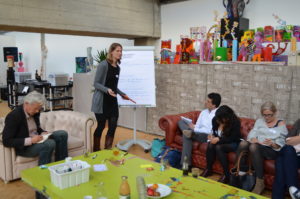In 2016, the Dutch Ministry of Foreign Affairs introduced public IATI data as a replacement for quarterly progress reports for their grantees1, and so dozen of (mainly Dutch) organisations have started integrating IATI into their internal management information processes, and worked on ways to include the results of their projects in the data they publish.
 In partnership with Data4Development, we’ve worked with Partos and the Ministry to explore lessons learned in this transition towards data-driven progress reporting. This included a workshop last year2, and, more recently, a consultation of several NGOs in February, exchanging views on results at the meeting of the Technical Advisory Group of IATI in March3, and leading a workshop with over 50 people from just over 40 organisations in April.
In partnership with Data4Development, we’ve worked with Partos and the Ministry to explore lessons learned in this transition towards data-driven progress reporting. This included a workshop last year2, and, more recently, a consultation of several NGOs in February, exchanging views on results at the meeting of the Technical Advisory Group of IATI in March3, and leading a workshop with over 50 people from just over 40 organisations in April.
After the “end of April deadline” helping organisations do another quarterly update of their data with our new spreadsheet conversion and quality feedback service, I’ve managed to condense the discussions and observations about the April workshop in a 7-page report4.
- Organisations need time to internalise IATI: many are in the process of integrating finances and monitoring and evaluation, and putting the data “in the right place” (which format, which activity, which organisation in a partnership).
- The IATI Standard provides a conceptual model and a data format to focus the discussions at an information systems level. Although the results part of the Standard can be improved, the real work right now is in aligning different systems and redefining the organisation’s data models.
- IATI is not intended for full financial accountability, nor for full learning and evaluation: information from financial systems and from PMEL systems should be included in IATI data, but usually only partly and at a more aggregated level. IATI can provide a higher-level, forward-looking view of progress and plans.
- For many larger organisations, this also implies that the people responsible for producing IATI (as progress report) are usually not the project officers or M&E officers. The latter have to provide the inputs and so IATI has an impact on how they organise or store information, but they don’t necessarily know (or even need to know) the details of IATI.
- For the people who do bear responsibility for the IATI publishing process, there still is a lack of both training materials to learn how to do the job, and tools to work with.
 With Data4Development I am concentrating on helping organisations with this:
With Data4Development I am concentrating on helping organisations with this:
- Introduce IATI in the organisation: determining the ambition level, scoping, mapping data and work processes, training people.
- Produce IATI data: whether with AidStream, their own system, or our new spreadsheet convertor service.
- Improve IATI data quality: providing feedback and workshops to explore ways to make the data better.
- Upgrade management information: assess the IT systems in use, and create a strategy towards a better information system landscape.
Notes
- Ministerie van Buitenlandse Zaken (2015) ‘How to use the IATI Standard’.
- Kleef, R. (2016) ‘Report of the IATI Learning Workshop’. Data4Development.
- Kleef, R. (2017) ‘Partos & IATI Results, TAG report’.
- Kleef, R. (2017) ‘Partos & IATI Results, Report back on the IATI Results Learning Workshop on April 11, 2017.’ Partos.



Data4Development organised with Partos workshop on working with results in IATI https://t.co/xZ7CooGpS7 #IATI https://t.co/dmqR60E8t3
RT @rolfkleef: Observations and results from the “Working with results in #IATI workshop” with @PartosNL and @Data4Developm https://t.co/Z4…
RT @rolfkleef: Observations and results from the “Working with results in #IATI workshop” with @PartosNL and @Data4Developm https://t.co/Z4…
RT @rolfkleef: Observations and results from the “Working with results in #IATI workshop” with @PartosNL and @Data4Developm https://t.co/Z4…
RT @martinekoopman: Data4Development organised with Partos workshop on working with results in IATI https://t.co/xZ7CooGpS7 #IATI https://t…
RT @martinekoopman: Data4Development organised with Partos workshop on working with results in IATI https://t.co/xZ7CooGpS7 #IATI https://t…
Good read from @rolfkleef, tirelessly sharing #IATI insights
Partos workshop on working with results in IATI https://t.co/q03Fw9Bqv4
RT @YohannaLoucheur: Good read from @rolfkleef, tirelessly sharing #IATI insights
Partos workshop on working with results in IATI https://…
RT @YohannaLoucheur: Good read from @rolfkleef, tirelessly sharing #IATI insights
Partos workshop on working with results in IATI https://…
RT @YohannaLoucheur: Good read from @rolfkleef, tirelessly sharing #IATI insights
Partos workshop on working with results in IATI https://…
RT @YohannaLoucheur: Good read from @rolfkleef, tirelessly sharing #IATI insights
Partos workshop on working with results in IATI https://…
RT @YohannaLoucheur: Good read from @rolfkleef, tirelessly sharing #IATI insights
Partos workshop on working with results in IATI https://…